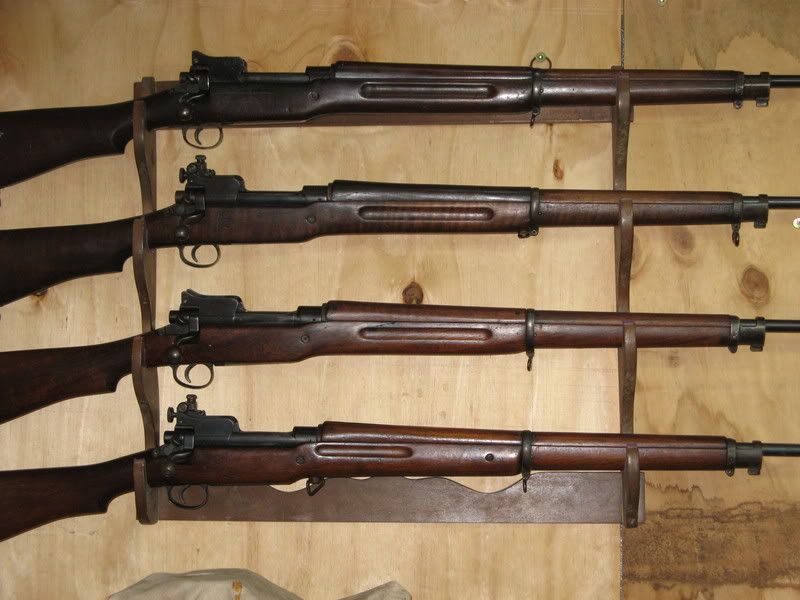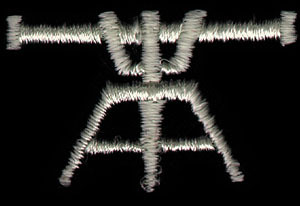

 The Accurate Reloading Forums
The Accurate Reloading Forums  THE ACCURATE RELOADING.COM FORUMS
THE ACCURATE RELOADING.COM FORUMS  Guns, Politics, Gunsmithing & Reloading
Guns, Politics, Gunsmithing & Reloading  Military & Military Surplus
Military & Military Surplus  Top Ten Battle Rifles
Top Ten Battle RiflesGo  | New  | Find  | Notify  | Tools  | Reply  |  |
| One of Us |
One thing caught me by suprise when I was in the USAF, 1980-84, SAC/HQ. The armory was chock full of M14's. I mean while all the SPs and cops had M16s and revolvers the armory must have had a 100 M14s. Never touched. Rich
| |||
|
| one of us |
Edmond I am with you, I really like the G3/H&K 91. I have shot and hunted with one quite a bit. I have used a H&K33K as a work gun, never a problem. Matt Norman Under the circumstances you outlined I would take a M-14. I would rather have 200 rounds of 308 than the other calibre choices. The M 14 can be easily sighted in to hit exactly ON. The sights have a built in BC for longer ranges. With a 20 round mag it would be good if attacked my Martin the Martian and his friends, and in 308, properly handled would kill most animals. Also I have found the M14/M1-A to be pretty reliable, sandy, cold, hot, wet, or dry. DOUBLE RIFLE SHOOTERS SOCIETY | |||
|
| one of us |
The G3 is heavy but its low cyclic rate (about 600 spm) makes it somewhat controllable full auto. (easier for me than an AKM). the HK and AUG trigger are easy to learn for non shooters. used by at least 60 countries I think, close third place to AK and FN. I prefer the para FN, but the G3 is my "garbage dump," for bad reloads and weird MG ammo. It will shoot anything. PS Military FN's are about 1/2 pound lighter than civilian ones. More lightening cuts in the receiver according to freinds at FN Herstal. A plus I think. Andy | |||
|
| one of us |
I had a coupla of FN-FAL's, a regular ands a Para. I liked the para the best, but not as much s thr H&K 91. All were plenty accurate enough, but the FN,s had a different point of impact with the bipod on, off up or down. Plus the normal scope mount attachment did not hold a repeatable zero. Plus I did not like the iron sights as well as the ones on the H&K. I have shot the Full Auto versions of the M-14, FN and the G3. I liked the G3 best, but in raeality that has little to do with my choice in the "Civilian" world. Andy, like you said, the H&K will shoot just about anything. I have hunted and taken quite a bit of game with the H&K 91, including my second biggest deer, and my second biggest antelope. It was my "lucky go to rifle" for several years. I could hunt for a few days and not see anything worth shooting, drag the 91 out and kill something that day. DOUBLE RIFLE SHOOTERS SOCIETY | |||
|
| one of us |
And not a very good one at that. Mauser sued for patent infringement and won the suit, so the U.S. had to pay Mauser $1 for every Springfield made. Jack O'Connor wrote of the Springfield, that those who designed it took a long look at the Mauser and made some changes in it, and in every case (of making a change) they laid an egg. I understand that Sgt. York preferred the Enfield because the rear sight was better for his style of shooting. "How's that whole 'hopey-changey' thing working out for ya?" | |||
|
| one of us |
I read an article once, I cannot remember who wrote it, about the different Military bolt rifles in use durring WW 2. The authors conclusion was that: The British made the best rifle for War. The Americans made the best rifle for target shooting. The Germans made the best rifle for hunting. DOUBLE RIFLE SHOOTERS SOCIETY | |||
|
| One of Us |
IMO the FAL/L1A1 wins hands down in the ergonomics department, especially with an 18" barrel. Actual use was by more than 100 countries, with several retaining it to this day - not everyone drank the 5.56 KoolAid | |||
|
one of us |
I still have admiration for the old Enfields. I doubt whether modern "battle rifles' could cut the mustard with the field conditions that these endured. This is my collection of Winchester M17/P14's.  Hold still varmint; while I plugs yer! If'n I miss, our band of 45/70 brothers, will fill yer full of lead! | |||
|
| one of us |
[QUOTE]Originally posted by Bad Ass Wallace: I still have admiration for the old Enfields. I doubt whether modern "battle rifles' could cut the mustard with the field conditions that these endured. This is my collection of Winchester M17/P14's. I don't think anybody expects the modern battle rifle to survive the shit these guys went through in WWl. Grizz Indeed, no human being has yet lived under conditions which, considering the prevailing climates of the past, can be regarded as normal. John E Pfeiffer, The Emergence of Man Those who can't skin, can hold a leg. Abraham Lincoln Only one war at a time. Abe Again. | |||
|
one of us |
I just went back and re-read some of these posts and something is wrong with this one! You state: "my late friend Captain Clifford Owen carried one (a Winchester 94 in .44-40) throughout the North Africa campaign against Rommel during WWII." I did not know your late friend and I was not in No. Africa in 1942 - indeed I was not even born yet and it was 20 years later I first set foot on Africa - but I don't think your friend carried a mod 94 in 44/40 in 1942. I would believe another caliber in a '94 or a 44/40 in mod '92 but I don't think Winchester chambered the '94 in any pistol calibers until after the 1964 re-do fiasco. Based upon what I know, and I'm always willing to learn more, this is a brief history of the '92 & '94: The 94 was offered in 25-35, 32-40, 32 Special, 38-55, 30-30, all of these rounds have the same length case, and all can be formed from the same case, say a 30/30 necked down to a 25/35, etc. the action is too long for a 32-20, 44-40 etc. The 92 was made in 32-20,38-40,44-40, they are short cases of about the same length. nor will the above long calibers fit on this frame/action. The '92 was often referred to as the 'Little Winchester'; I have always thought it the best handling and balanced of all the Windchanger lever guns. Check your facts, I'd really like to know what he carried. And whatever it was, if it was indeed chambered in 44/40, where did he get ammo for it? Lord, give me patience 'cuz if you give me strength I'll need bail money!! 'TrapperP' | |||
|
| One of Us |
It was definitely 44-40 as I saw it and was offered a shot with it but declined as the cartridges were by then quite old. They were, if I recall REM-UMC. The rifle had again from memory a round barrel which was, I think 20" long. I'm not a expert on Winchesters and like most "know nothing" Brits all Winchesters to us are either 73's or 94's if not! So, whatever Winchester it in fact was it was in .44-40. Also the British Royal Navy imported these pistol cartridge (.44-40) chambered Winchesters in World War 1 for use as guard rifles and I believe also for use by their pilots. This from a quick search on the internet on another forum:
Britain in between the two World Wars did import a lot of stuff from the USA. I've recently seen a Model 54 in 270 WCF offered for sale, for example, that has British Proof Marks that indicate it was imported in that period. As we still had a large colonial empire many guns were imported for onward sale to those "going abroad" where a defensive rifle might be though wise. Indeed in the 1920s Vickers were advertising .276 Pedersen rifles as suitable for that use in "unsettled" parts of the colonies! | |||
|
| One of Us |
Early Model 1894 Calibers: .32-40 – introduced in 1894 .38-55 – introduced in 1894 .25-35 – introduced in 1895 .30 W.C.F. (30-30) – introduced in 1895 .32 Winchester Special – introduced in 1902 The U.S. Army purchased 1,800 Model 1894 carbines on December 29, 1917 to help guard strategic defense industries in the Pacific Northwest. Production of receivers was suspended in 1943 during World War II. As serial numbers approached the one-million mark, the official model designation was changed from Model 1894 to the Model 94. The 1,000,000th Model 94 was presented to President Calvin Coolidge in 1927. As many special orders features were available, a variety of interesting configurations can be found in both rifles and carbines making the Model 1894 one of the most collectable of all Winchesters. | |||
|
| one of us |
How does this differ from the Steyr AUG?
Wasn't sure about the meaning of "ergonomic" - sounded like one of those New-Age words. So I looked it up in my dictionary, and there was a picture of a Belgian 50.00. | |||
|
| One of Us |
Yeah, and locally the 1894 Marlin in 44 mag. (Ten rd. capacity) is known as the "backwoods assault rifle." It's still being manufactured, ten rds. in 44 mag. and you can mount a scope on top of the receiver, run a cleaning rod from the breech. | |||
|
| new member |
What was it about the SKS that made it obsolete? | |||
|
| One of Us |
It was like the Garand, the FN 1949 and the other host of ten shot (or less) self-loading rifles. If there had not have been anything else and firearms design had stopped just after WWII they would have been great. But better, higher magazine capacity, cheaper to make alternatives came along firing a cartridge more in tune with post-WWII fighting requirements. | |||
|
| One of Us |
I have a 1966 made obsolete Yugo SKS that I would feel fairly safe with, as will put all ten on a head size target at 100yds. The SKS is for those that shook the AK for those that spray! | |||
|
| One of Us |
"I understand that Sgt. York preferred the Enfield because the rear sight was better for his style of shooting." Quote from Lloyd Eby Not true, actually the reverse. Alvin York prefered the M1903 as the rear sight is basically open, while the M1917 uses "peep" sights. He had trouble leading a "target" with the peep according to his son when interviewed. His unit had been issued M1917's but the resourceful CPL York had somehow "found" a Springfield. All these rifles mentioned have both good and bad points, yet ALL have been successfully carried and used in combat many, many times. I've found that a rifle that one finds a "great fit" doesn't fit all people. Example" FN/FAL, while I really like the rifle, I find the grip angle far to steep. All these rifle have maintenance issues, period. You can't use a rifle over, an over, an over without cleaning it and oiling it. Regardless of design, all require cleaning. Some a little more than others. So what? Some may think that one rifle deserves a spot on the list over another. Opinion from both sides. Really, who gives a rip? Earlier someone said that the M1903 really deserved a place before the M1917. Opinion as the M1917 has been proven to have superior BATTLE SIGHTS than the M1903. Really now, wasn't it supposed to be a BATTLE RIFLE? The M1917 has also been proven to continue to work under the worst of conditions while the M1903 has problems. So what? They are both fine rifles, both used in battle, both loved (and hated) by many people. One man's blessing is another mans curse. Regards, Eric "We must all hang together, or assuredly we shall all hang separately." Benjamin Franklin, July 4 1776 Lost once in the shuffle, member since 2000. | |||
|
One of Us |
I disagree with this ranking, because it takes into consideration such things as how long a given weapon was in active service. For example, they rate the M1 ahead of the M14, when in reality the M-14 is an IMPROVED M1. Ask anyone who has used both the M1 and the M14 in combat! They will all tell you that the M14 has all the reliability of the M1, is faster/easier to reload under combat conditions, doesn't make the "ka-ching" that the M1 used to tell your enemy that your rifle is empty, and is more accurate than the M1. In addition, the M16 vs the AK in combat-the choice depends on the combat environment. IF you are fighting a close-in fight, where hitting something beyond 200 meters is unimportant, then the AK 47 had an advsantage. The round it fired was better, too. But the Russians chose to surrender this advantage by adopting the AK74, chambered for another of those .22 varmint cartridges, the 5.45X39mm. If however, the battle you are fighting entails some shooting at distant targets, the M16 is better; but neither is as good as the M14 for that kind of war. It will reliably reach out and touch someone quite a ways downrange, and do it with more authority than an M16 can muster. When it comes to bolt-action COMBAT weapons, none were ever even as good as than the Lee-Enfield in its' various forms, particularly the Mark III (ol' SMELLY) and the No. 4! The 1903A3 Springfield doesn't even make the cut as a combat rifle in my book-the M1917 Enfield was a better rifle than the 1903 Springfield in any form. It was never standardized due to the "not invented here" syndrome! It is both more rugged, and has better, more precise, and faster sights than any military bolt-action rifle except the 03A3. In addition, the front sight blade on all the 1903 family of rifles is totally exposed out there in the air, with no protection from bending or breakage at all. One good bayonet charge, and you could be w/o a front sight! I have personally used every rifle on that list except the Steyr AUG and the STG44. I have used the M1, M16, M2 Carbine, and the M14 in actual combat operations. Of all those listed, the M14 is the best, most effective of them all!! Why do you think so many M14's have been resurrected and sent to Iraq and Afghanistan?? "Bitte, trinks du nicht das Wasser. Dahin haben die Kuhen gesheissen." | |||
|
| One of Us |
Go get 'em "El!" You are absolutely correct. Eric "We must all hang together, or assuredly we shall all hang separately." Benjamin Franklin, July 4 1776 Lost once in the shuffle, member since 2000. | |||
|
One of Us |
I certainly accept the assertion that your compadre used a Winchester chambered for the .44/40. However, if it still had a Winchester-made barrel and was a .44/40, it was either an 1873 or an 1892 (M92). It is certainly possible that someone in England rebarreled a Model 1894 (94) to .44/40. But the only Winchester lever action rifles made in the timeframe necessary to be used in WWII were the two models listed above. As the gentleman above pointed out, Winchester has more recently made some M94's to use pistol rounds such as the .44 Magnum and .45 COLT (after they went the cheapo route!!), but not prior to that. "Bitte, trinks du nicht das Wasser. Dahin haben die Kuhen gesheissen." | |||
|
| One of Us |
Discover Channel recently ran "Top Ten Weapons of the World." (Since about 1960) Number ten was the RPG 7 -- rocket propelled grenade. Number one, putting things in perspective, is the Nimitz class carrier. Number seven -- AK-47. Three moving parts, light, cheap, simple to use, deadly. The principal asset was that it was reliable when used by peasants, reliable in the mud/crud/blood. And the Soviet Union was able to mfg. them and supply them to revolutionaries world-wide. Production of the AK-47 is running about 100 Million. | |||
|
| One of Us |
Such a list is completely subjective and practically impossible to achieve a consesus. For me the list is determined by real practical experience serving; not that of occassional range usage at the weekends. I also agree that the list would change in different environments. For me No1 will always be the SLR (FN FAL). I used it most of my service life, i know it completely and it's reliable. Nothing knocks on a Belfast door like the butt of an SLR! If in an environment where range is short and the conditions make regular maintenance impossible or unlikely then it would have to be an AK - provided i could choose where and who made it. The worst examples i ever came across were used by the Croats and were Romanian in manufacture. I may prefer an M98 in my gun cabinet, but i'd rather go to war with an enfield for all of the reasons stated earlier by others. | |||
|
| Powered by Social Strata | Page 1 2 |
| Please Wait. Your request is being processed... |
|

Visit our on-line store for AR Memorabilia

